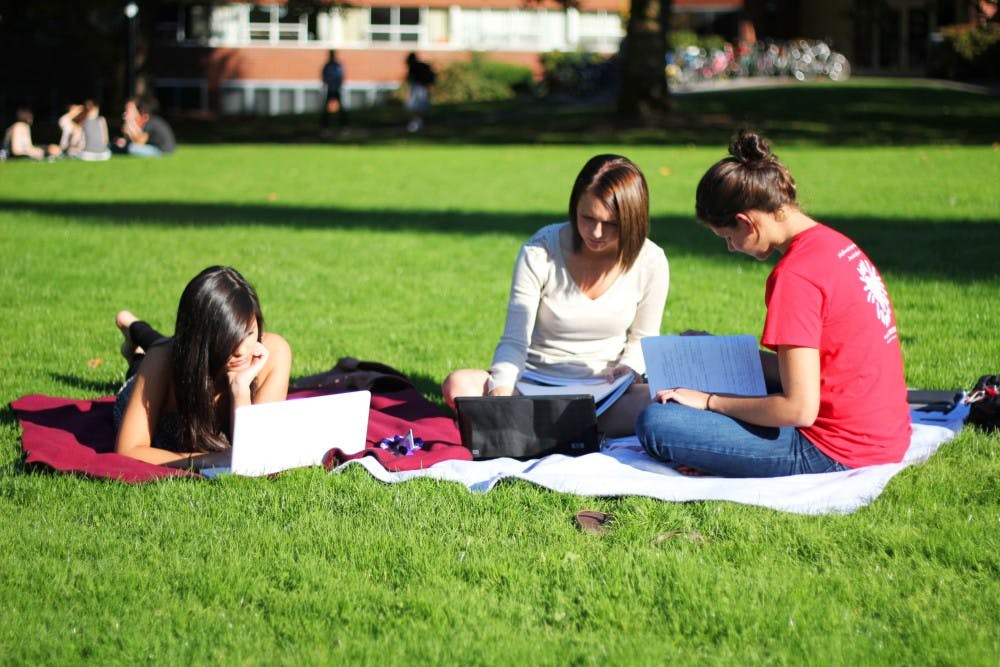UP freshman rentention rises to almost 90 percent
Freshmen Alison Wrede, Emilie Carroll and Jordan Anderson study outside. UP freshman retention increased to 89.2 percent last year, up from 86 percent in 2008. (Scott Chia -- The Beacon)
By Sarah Hansell, Staff Writer -- hansell14@up.edu
According to the National Center for Higher Education Management Systems as of 2008, 74.7 percent of US college students return to school after their freshman year.
In Oregon, the percentage is 74.1 percent.
At UP, it is now 89.2 percent – the highest ever. The freshman retention rate has improved from 86 percent in 2008 to the current record high, according to Karen Nelson, director of Institutional Research at UP.
"You can tell people care and people are making this an issue," said Eric Anctil, professor of the School of Education and member of the Rentention Task Force.
In October of 2008, President William E. Beauchamp created the Retention Task Force with the goal of improving retention at UP. The Task Force made about 40 recommendations, which were carried out by a group called The Enrollment Management Group, headed by John Goldrick, vice president for enrollment management and student life.
"The reason the University has been successful at retaining more students…is because the University has begun to operationalize (the Task Force's) recommendations," Eric Anctil, professor in the School of Education and member of the Task Force said.
Academic changes are being made to help students achieve better grades and pass their classes, such as altering math classes to a more doable level and also requiring professors to issue midterm grades.
"All lower level classes have to give out midterm grades, so that gives students earlier feedback about their academic process," Nelson said. "It helps them adjust."
There are also changes to improve the social atmosphere for UP freshmen, such as the Shepard Freshmen Resource Center, the pre-academic year service plunge for new students, and requiring freshmen to live on campus.
"We put in a requirement (for freshmen) to live on campus with the idea that living on campus creates stronger ties to the community," Nelson said.
Stronger advising and resources such as the Shepard Freshman Resource Center help provide freshmen with the resources and guidance they need when they are feeling as though UP isn't where they belong.
"When students are feeling that this isn't the right fit, they often don't tell anyone until they've made up their mind, and then there's no chance to help them find a way to fit here if this is the right place for them," said Kristen Bryant, special projects coordinator at UP.
However, the main thing the University is trying to improve is that freshmen feel they belong here.
"One of the biggest things we focused on (in) the Retention Task Force was goodness of fit," Anctil said. "What can we do to make people feel like they made the right choice and fit in here?" According to last year's retention rates and what many freshmen say, the University is achieving its goal.
"I think part of it is admissions is doing a great job making sure students knows the school and know it'll be a good fit," Bryant said.
"The reason why I want to stay here is that I like the small classroom sizes," freshman Alyssa Opland said. "And I didn't think I would, but I like the small size of the university, it makes it more like a community."
UP continues to implement changes to improve not just freshmen experiences, but the experiences of all of its students, and provide students with the resources they need when they are questioning whether or not UP is the place for them.
"Changes to advising are not quick, because that's something the faculty look at and take very seriously," Bryant said.








